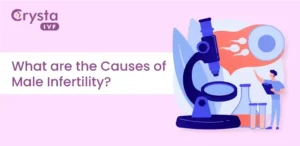Often a myth prevails in society that the biological age of the women decreases the chances of getting pregnant. Well, it’s time to acknowledge the facts and bust the myths. Recent studies and researches reveal that biological age in men is a significant cause of Infertility in Men. From a biological perspective, the quality and quantity of sperm decline with age.
As per the expert recommendation, the best age for fatherhood is between the late 20s to early 30s. There is no denying that men over 50+ years can also become fathers, but researchers reveal that age declines the chances of women getting pregnant.
The success rate of conceiving in women with partners above 40 years of age is much lower than in those with partners between 22 to 35 years.
Let’s Understand Briefly- The Relation Between Male Infertility and The Biological Age
Typically, Men don’t really stop producing sperm, but that does not comply that their biological age does not impact their fertility rate.
Impact of Biological Age on Male Fertility:
- With the increasing age, the male sperm undergo genetic mutations, which often lead to damage to DNA in sperm.
- Several pieces of research reveal that children born with advanced paternal age often suffer from neurodevelopmental disorders.
- In severe cases of sperm deformation, natural pregnancy is not possible, and it requires Male Infertility Treatment.
- Also, the risk of Autism Spectrum Disorder is higher in children born to men over 40 years of age compared to those below 40 years of age.
In short, age might not lead to complete Infertility in Men but can create severe pregnancy complications. So, medical professionals recommend planning your family on time and within your fertility age.
If you are still in confusion, how can age impact male fertility? Let us understand the relationship between age and sperm health.

Different Ways in Which Age Impact Sperm or Sperm Health:
As per the standards set by the World Health Organization for healthy sperm, sperm count, motility (sperm movement), and morphology, everything altogether defines sperm health. With age, men do not stop producing sperm, but there is a halt in the production of healthy sperm. The reports reveal sperm health starts degrading after 35 years of age.
Well, the question arises what can be the consequences of poor sperm health?
So, the answer is based on different health conditions; men can experience different consequences, and it does not remain standard for all. Some of the common consequences can be:
- The sperm count in the single ejaculation is much less than the 15 million ml of sperm, which is a usual health count for uncompromised male fertility. At 35+ years, it’s common in men, especially in those practicing unhealthy lifestyles.
- Another thing leading to challenges in pregnancy due to sperm health is deformed sperm shape. The changed morphology of the sperm results in failed penetration of sperm in the egg, and thus there is no embryo formation. These Male Infertility conditions often require medical consultation or ART procedures like IVF Treatment for pregnancy.
- Now, yet another essential aspect of sperm health is sperm motility. If 40% of sperm released during ejaculation are ideally moving, then there exists a possibility for pregnancy. With increasing age, especially in men 40+ years, sperm mobility is less than 40%, and thus the fertility in men reduces significantly.
Apart from the lower chances of pregnancy with increased age, there is a higher risk of miscarriage for men above 45+ years. Here, the cause of miscarriage is poor sperm health, irrespective of women’s fertility and age.
Age Affects Sperm Health, But There Are Other Factors Too:
Infertility in Men or Sperm Health is directly proportional to the male’s age, and apart from that, several other factors can impact sperm health and, ultimately, male fertility. It includes:
- Chain Smoking
- Extensive Alcohol Consumption
- Drugging Habits
- Poor Diet and Lack of Nutrients
- Obesity
- Diabetes
- Stress
- Cancer, and
- Other medical, physical, physiological, and psychological conditions impact sperm health.
Also read: How Many Sperms Are Needed To Get Pregnant?
What’s The Solution to Age Leading to Infertility in Men?
If you are continuously trying for pregnancy for a year, and are still unable to complete your family, then it’s recommended to opt for Male Infertility Test. These tests help reveal the actual reasons for male infertility, whether the cause is age or any other reason impacting your fertility.
Some of the common tests to detect Infertility in Men include:
Physical Evaluation
During the physical examination, you have to undergo evaluation by a urologist. Here, the doctors will examine your testicles and check if there are any deformations of veins in the testicles or varicoceles. Also, the doctors can ask for your medical history if the physical examination reports are inconclusive.
Sperm/Semen Analysis
Another test to check Infertility in Men is semen analysis. Semen Analysis is essential to check all three crucial factors of sperm health that is morphology(shape of sperm), mobility(movement of sperm), and sperm count. The proper diagnosis is essential to avail of the appropriate Male Infertility Treatment. Doctors at Crysta IVF customize the treatment plan for every couple based on the cause of infertility.
Hormonal Test
Testosterone levels and other reproductive hormones are essential to define male fertility. So, hormonal evaluation plays a vital role in determining the cause of Infertility in Men.
Suppose the Infertility Tests specified above do not lead to conclusive results; In that case, the doctors at Crysta IVF- The Best Fertility Clinic in Delhi might recommend you for additional tests like genetic testing, retrograde ejaculation, and more.
Also, if the results remain inconclusive, the doctors may suggest a female Infertility Test on your partner.
Ways to Preserve Sperm Health and Avoid Infertility in Men
Maintaining a healthy lifestyle is the best way to keep sperm health and male fertility intact. However, only the reversible causes of male infertility are in your control. If the impact on your fertility or sperm health is because of age, it is irreversible.
So, it’s better to decide on parenthood at the right time. If you still wish to delay the pregnancy and family planning beyond your fertility age, then you should first make the right decisions at the right for your fertility. You can opt for sperm preservation or embryo preservation tactics that allow you to conceive even after your fertility age.
However, the Cost of IVF Treatment in Delhi NCR varies based on the customized procedure. So, you can take a quote well in advance well in advance to avoid any physical, mental, or financial stress before initiating your infertility treatment.
Stay Tuned For More Updates on The Causes and Treatment of Infertility in Men and Women.




